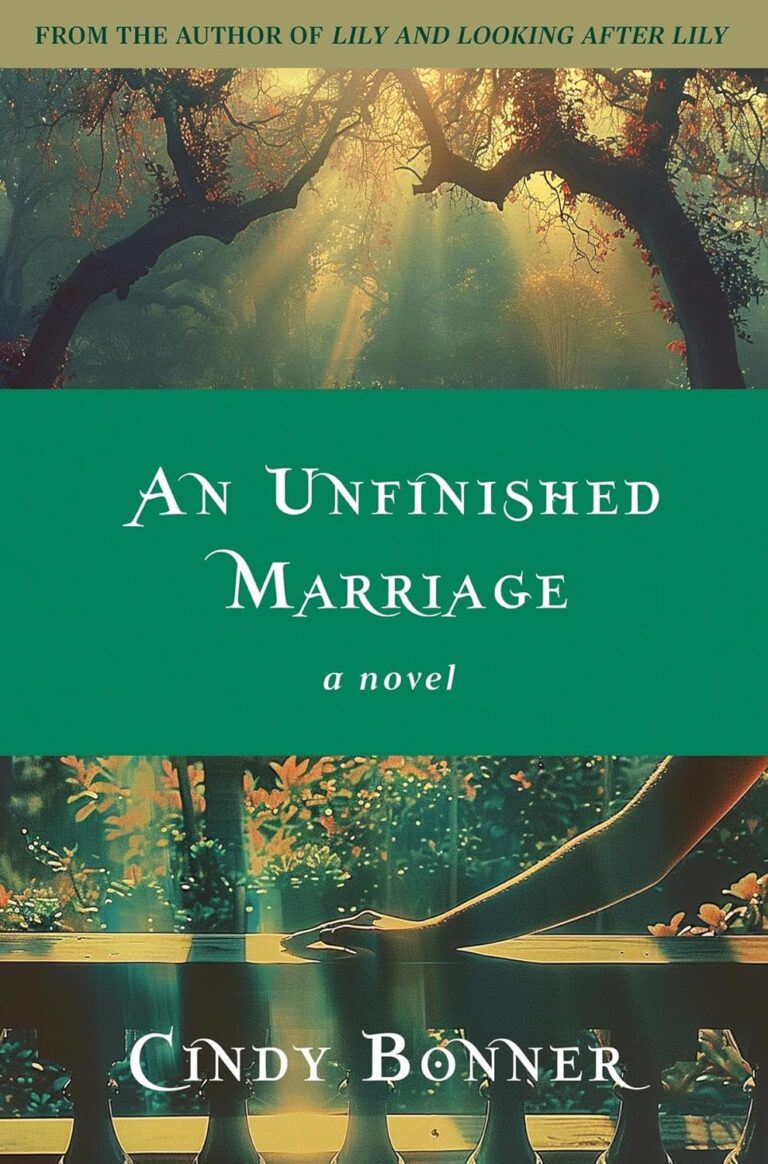An Unfinished Marriage received a 4+ star review, making it an IndieReader Approved title.
Following find an interview with author Cindy Bonner.
What is the name of the book and when was it published?
An Unfinished Marriage. October 10, 2024
What’s the book’s first line?
“When Adam comes home, I’m downstairs in my nightgown.”
What’s the book about? Give us the “pitch”.
Sarah Glasser has always been a good girl, striving for perfection in her life with husband, Adam, and their sons. A good mother: she volunteers at the school. A good wife: she runs their household precisely. When Adam comes home late from a business meeting, drunk and agitated, asking for a divorce, Sarah is shaken by thoughts of an unknown life altered from the one she has cultivated. While the collapse of a marriage is a tried-and-true plot, the characters in An Unfinished Marriage are complex and relatable, with humor lightening the drama. The layers of the story peel away to reveal familiar feelings of devotion, betrayal, selfishness, and the complicated love between women and men, parents and children, and friends who sometimes become enemies.
What inspired you to write the book? A particular person? An event?
An event in my own life inspired this story, with the addition of a what-if element. By the time the manuscript had gone through the many drafts it takes to write a long novel, the story barely resembled the actual inspirational event.
What’s the main reason someone should really read this book?
It’s fast-paced, and filled with situations many people have found themselves in during their lives. If a reader likes family dramas, I believe they will find this novel satisfying.
What’s the most distinctive thing about the main character? Who-real or fictional-would you say the character reminds you of?
Sarah Glasser went into her marriage out of college with an idea of a traditional marriage as her expectations. Fifteen years into it she realizes her husband has a different idea of what their lives should be. Her dilemma is one many women face: to continue in her marriage making the best of things for her children’s sake, or making the break to go another direction in pursuit of personal happiness. She reminds me of many young mothers who strive to make a stable home for her children at the expense of her own fulfillment.
When did you first decide to become an author?
I have wanted to be a writer since I was in grade school, but didn’t start writing seriously until I was in my late twenties. My first book was published when I was thirty-eight, so it took a while.
Is this the first book you’ve written?
No, this is the sixth novel I have completed and seen into print. It is about the ninth I have written. All the unpublished ones are packed away in my attic, marked LEARNING TO WRITE.
What do you do for work when you’re not writing?
I’m retired, but I have a full and active social life, and do volunteer work at the local theater.
How much time do you generally spend on your writing?
When I’m in the midst of a project I go at it with gusto, spending most all of my awake time on it, either doing a first draft or one of the many rewrites it takes for me to get the work as near to my vision as I can.
What’s the best and the hardest part of being an indie?
Definitely the marketing and promotion.
What’s a great piece of advice that you can share with fellow indie authors?
As soon as you make the decision to indie publish, start making a plan for the marketing end. If you don’t have a website, get one. Ditto for social media. It you don’t have a list of readers’ emails, make one. Think about promotional materials, flyers, bookmarks, professional business cards. By the time you have finished the writing project, all the promotional pieces should be in place.
Would you go traditional if a publisher came calling? If so, why?
My first four novels were published by a traditional publisher, and I would probably go with one again if their deal was to let me have some control over the title, cover art, and interior design. The publisher I had for the first novels kept only one of my original titles; all the others got a title change, not always for the better. And I had no control, or even final approval of cover art which is important to me. I felt some of the covers the publisher produced didn’t adequately convey the essence of the story. However, tradional publishers are better able to market and promote. One of those traditionally published novels came with a twenty-city book tour, all arranged and paid for by the publisher. That part was nice.
Is there something in particular that motivates you (fame? fortune?)
Writing seems to be in my DNA. I can’t stop. I don’t have any delusions of grandeur. I want to be read. That’s my main motivator. I’ve been traveling down this writing road for four decades, with modest success and many disappointments. I understand how rare fame and fortune are for writers; something like .02% might get there. If it were to happen, great. In the meantime I will continue to write in hopes readers will enjoy my work.
Which writer, living or dead, do you most admire?
One living writer I admire is Anne Tyler. One dead writer I envy is Ken Kesey.
Which book do you wish you could have written?
One Flew Over the Cuckoo’s Nest.

